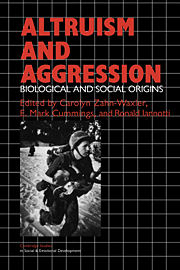Book contents
- Frontmatter
- Contents
- List of contributors
- Editorial preface
- Introduction: Altruism and aggression: problems and progress in research
- Part I Biological, sociobiological, and ethological approaches to the study of altruism and aggression
- Part II Development, socialization, and mediators of altruism and aggression in children
- Conclusions: lessons from the past and a look to the future
- Index of names
- Index of subjects
Conclusions: lessons from the past and a look to the future
Published online by Cambridge University Press: 04 August 2010
- Frontmatter
- Contents
- List of contributors
- Editorial preface
- Introduction: Altruism and aggression: problems and progress in research
- Part I Biological, sociobiological, and ethological approaches to the study of altruism and aggression
- Part II Development, socialization, and mediators of altruism and aggression in children
- Conclusions: lessons from the past and a look to the future
- Index of names
- Index of subjects
Summary
The initial, broad-based formulation of the issues to be addressed here – namely, the social and biological origins and interconnections of altruism and aggression in humans and animals – precluded the possibility of emerging with tidy, integrative statements or conclusions. Our major aims in the workshop on biological and social origins of altruism and aggression were, rather, (1) to begin to articulate what is not known, (2) to stimulate research interest in questions requiring an interdisciplinary approach, and (3) to create an opportunity for dialogue and collaboration between investigators with different areas of expertise in the biological and behavioral sciences. While we moved in this direction, we were humbled by the considerable research task ahead. A crucial problem is that both existing theories and projections for future research on altruism and aggression are determined by a thin, normative data base, regardless of the species studied.
In developmental psychology, there are few data based on strong, naturalistic, and experimental research methods regarding age-related changes in altruism and aggression. Prevailing theories, too, have contributed to a constrained view of prosocial and antisocial development in children. The child is commonly studied as an organism that is (1) detached from the environment in which it is reared and (2) disembodied from the future adult state, which would convey, perhaps more vividly, the possible complexities and extreme variations in altruism and aggression. Behaviorism and learning theory approaches have not encouraged exploration and analysis of emotions and motives underlying altruism and aggression.
- Type
- Chapter
- Information
- Altruism and AggressionSocial and Biological Origins, pp. 303 - 324Publisher: Cambridge University PressPrint publication year: 1986
- 2
- Cited by

